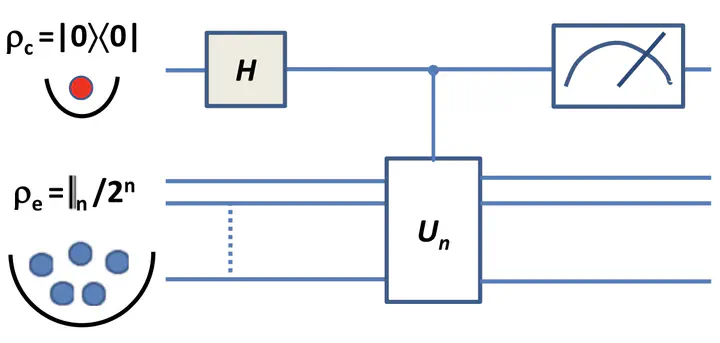Demonstration of Deterministic QC with one clean qubit (DQC1) on a neutral atom array

Demonstration of Deterministic QC with one clean qubit (DQC1) on a neutral atom array
Project highlights:
- Join a pioneering project at the forefront of quantum computing research.
- Work in a world-class laboratory with state-of-the-art cold atoms platform for quantum computing.
- Gain expertise in experimental quantum physics and quantum computing.
Project description:
Deterministic QC with one clean qubit (DQC1) is a non-universal model of computation based on mixed states that can speed up some computational tasks for which no efficient classical algorithms are known. DQC1 protocols present a remarkable advantage, in requiring only a single coherent qubit to perform large scale QC, whilst its power scales with the number of mixed state qubits. DQC1 does not rely on entanglement; instead, weaker non-classical correlations are sufficient to achieve a quantum advantage for specific computational tasks. Notably the processing time required remains independent on the complexity of the task1. Experiments conducted to date1,2,3 have been limited to a very small number of qubits, leaving the question of whether DQC1 can achieve quantum advantage unresolved. To address this question, DQC1 must be tested and benchmarked in platforms that can scale to operate in large Hilbert spaces.
A proposal to investigate the physics of DQC1 with neutral atoms in tweezer arrays has been put forward by the OU team4. This involves retrieving the normalized trace of a 2N×2N arbitrary unitary matrix. The inherent scalability of the platform will allow testing the robustness of the protocol for large qubit numbers. With an ensemble of 100 mixed state atoms (qubits), the protocol can already efficiently solve adding up 1030 terms, a classically intractable problem. The Square experiment in Strathclyde (SQuAre) is a state-of -the-art tweezing facility for cold atoms, the most advanced in the UK. It enables arbitrary spatial arrangement of hundreds of atoms that can be globally or individually addressed. Multi-qubit quantum correlations are established via Rydberg state-based quantum logic gates5.
Implementing DQC1 with SQUARE will allow invaluable insights into the algorithm’s performance and robustness in larger quantum systems. Beyond experimentally validating the protocol, this effort will also assess the scalability and resilience of mixed-state computation and develop algorithms for non-trivial unitary matrices, extending to machine learning demonstrations3 tackling significantly complex problems. The project provides access to state-of-the-art research facilities and training at both OU and Strathclyde, along with regular collaboration with leading experts in quantum computing and experimental physics. There will be a requirement to attend periodic meetings of the Oxford QCi3 Hub, which funds this project.
Note that the project will be hosted at the OU in years 1 and 3, and will require moving to Strathclyde for one year (tentatively year 2) and regular trips between the two host institutions.
For more information or to discuss the project, please contact Dr Silvia Bergamini silvia.bergamini@open.ac.uk or Prof. Jonathan Pritchard - jonathan.pritchard@strath.ac.uk.
- Availability: Open
- Start date: Available now - Apply Here
- Contact: Dr Silvia Bergamini
- Contact: Prof Jonathan Pritchard
References
- Knill, Laflamme Phys.Rev.Lett. 81, 5672 (1998)
- Karimi, M et al., Sci Rep 13, 19975 (2023)
- Hor-Meyll et al. Phys. Rev. A 92, 012337 (2015)
- C W Mansell and S Bergamini New J. Phys. 16, 053045 (2014)
- Farouk, Bergamini et al, Photonics 10, 1280 (2023)